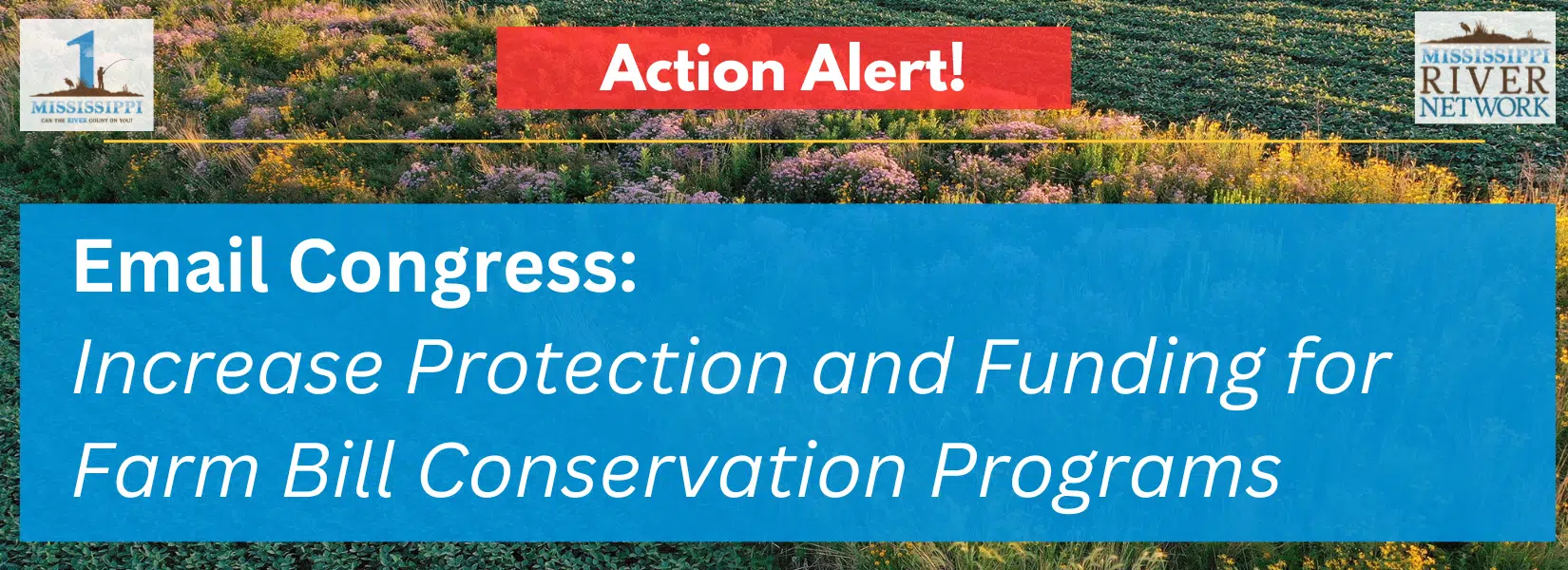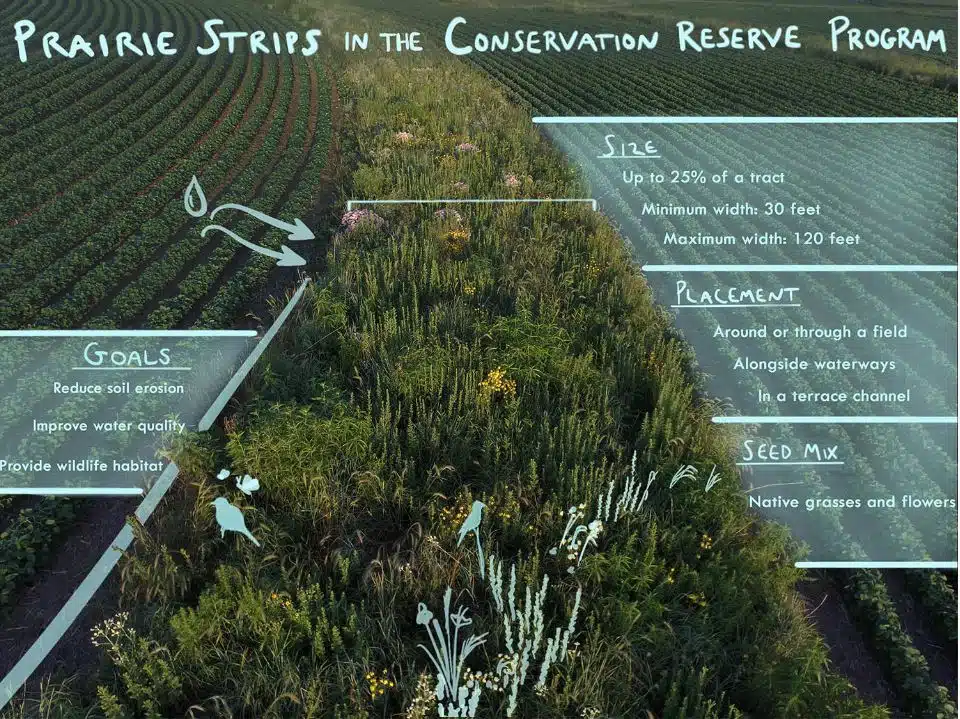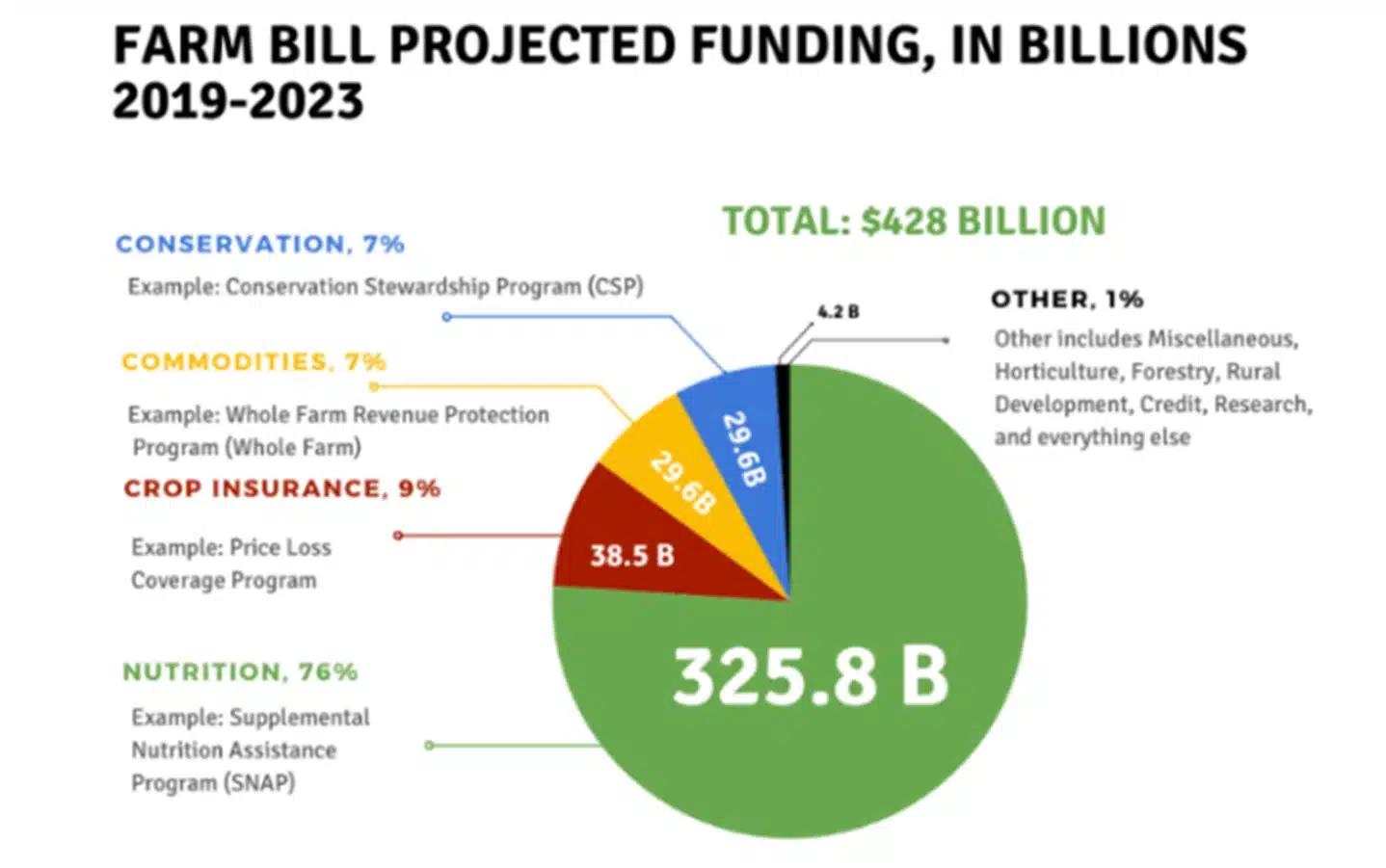Take the River Days 2023 Action Now!
Join the movement of everyday people from across the country speaking up for our Mississippi River as part of River Days of Action June 8 – 18th, 2023. This year’s River Days advocacy opportunity calls on Congress to increase protection and funding for vital Farm Bill Conservation Programs. Will you speak up and take action today?

That’s why we are calling on Congress to increase protection and funding for Farm Bill Conservation Programs. These vital conservation programs offer smart solutions that support the local economy and protect people, land, water, and wildlife. But these funds need to be protected and increased to meet the current demand. Make a difference by speaking up and sending an email now!
MORE INFORMATION ABOUT THE FARM BILL AND THIS ACTION

Farm Bill Conservation Programs provide vital environmental protection and employment opportunities in rural America. For example, the pictured prairie strip in an Iowan farm field is supported by a Farm Bill Conservation Program called Continuous Conservation Reserve Program (CCRP). The CCRP pays farmers to install partial field conservation practices to reduce soil erosion and preserve critical wildlife habitats, like wetland buffers, filter strips, riparian buffers, wildlife habitat buffers, wetland restoration, windbreaks, and pollinator habitats. Photo/Graphic credit Omar de Kok-Mercado and Iowa State University STRIPS Program.
Every five years or so since the Dust Bowl of the 1930s, our federal government has debated, passed, and signed a complex bill that drives food and farm policy. From farmer’s markets to farm fields, nutrition to nutrient management plans, and everything in between, each Farm Bill covers a lot of ground. Our current 2018 Farm Bill has guided agricultural policy for the last five years and spent nearly $430 billion dollars on our food and farm system (1). Now, it’s time for Congress to write Farm Bill 2023. Let’s make sure they know – like we do – how this Farm Bill can support our Mississippi River.
While the Farm Bill is a massive piece of legislation, there is one slice that can make a big impact on our waterways — the Farm Bill’s Working Lands Conservation Programs. These programs fall under the Conservation Title of the Farm Bill and account for almost $30 Billion (or 7%) of Farm Bill spending. These voluntary programs help farmers reduce soil loss and mitigate environmental impacts through practices that support healthy soil, flood resilience, and functioning habitats. Farm Bill conservation programs offer some of the most cost-effective solutions available to agricultural and ranching communities. What’s more, farmers up and down the Mississippi River strongly support and benefit from these programs, and there is always far more interest than funding (2).

Farm Bill’s Working Lands Conservation Programs account for almost $30 Billion (or 7%) of Farm Bill spending. These voluntary programs help farmers reduce soil loss and mitigate environmental impacts through practices that support healthy soil, flood resilience, and functioning habitats. Source: USDA Economic Research Service Based on Congressional Budget Office, Direct Spending Effects for the Agriculture Improvement Act of 2018 (2018 Farm Bill), December 11, 2018 (via National Sustainable Agriculture Coalition).
There is a lot of overlap between our Mississippi River’s watershed and regions where intense agricultural and livestock operations take place in our country. Excess fertilizer from agriculture and other chemicals from our cities, run off into our rivers and result in “hypoxia” or dead zones in our local ponds, lakes, and beaches. Compounded over the entire River watershed, we see giant dead zones like the one in the Gulf of Mexico (3).
How Farm Bill Conservation Programs Help Water Quality
Programs and funding in the Farm Bill help reduce pollution by ensuring that farmers and ranchers have access to a variety of tools that help support not only healthier farms but also healthier rivers. For example, conservation programs can fund cover crop systems that keep roots in ground, leading to soil with increased organic matter and increased capacity to store flood water. Conservation programs can fund riparian buffer strips or perennial prairie strips that provide habitat for native plants and animals.
Farmers rely on the Farm Bill’s Conservation programs to help them make their farms more resilient and productive. But these programs can only help farmers if they are funded. The 2018 Farm Bill included almost $30 billion in funding for the Conservation Title and the Inflation Reduction Act of 2022 (IRA) presents an opportunity for an additional $20 billion in funding for these programs over the next 5 years. We urge Congress to protect funding for conservation in the Farm Bill and in IRA.
The Conservation Title experienced major cuts in the 2014 Farm Bill and has been subject to repeated annual cuts through sequestration and the appropriations process since then. We urge Congress to protect and increase funding for Conservation Title programs like the Environmental Quality Incentives Program (EQIP) and the Conservation Stewardship Program (CSP) in the 2023 Farm Bill and ensure IRA funding is used for climate-smart agricultural practices and Farm Bill conservation programs. This funding is critical to begin to meet the demand from farmers and ranchers in the ten Mississippi River states for these clean water and healthy habitat practices.
Further Resources
Please contact the Mississippi River Network’s Policy Director, Maisah Khan at mkhan@1mississippi.org with any questions.
- National Sustainable Agriculture Coalition (NSAC), “What is the Farm Bill?” https://sustainableagriculture.net/our-work/campaigns/fbcampaign/what-is-the-farm-bill/
- Institute for Agriculture and Trade Policy (IATP), “Still Closed Out: More progress needed to connect farmers with federal conservation programs,” https://www.iatp.org/still-closed-out
- 1 Mississippi program, “Reducing Nutrient Pollution,” http://edl.hgu.mybluehost.me/1mississippi/nutrient-pollution/
